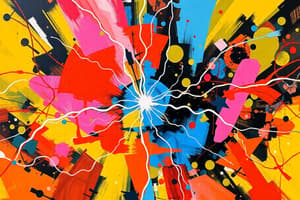Podcast
Questions and Answers
The flow of electric charge is called ______
The flow of electric charge is called ______
current
Question 1
Question 1
Explain the difference between AC and DC current, and provide an example of each.
Answer 1
Answer 1
AC, or alternating current, is a type of electrical current that periodically changes direction, while DC, or direct current, flows continuously in one direction. An example of AC is the electricity supplied to homes and businesses, while an example of DC is the electricity stored in batteries.
A device that converts electrical energy into mechanical energy is called a ______
A device that converts electrical energy into mechanical energy is called a ______
The unit of electric power is ______
The unit of electric power is ______
Question 2
Question 2
Answer 2
Answer 2
Question 3
Question 3
Answer 3
Answer 3
Flashcards
Electric Current
Electric Current
The movement of electric charge through a conductor.
Alternating Current (AC)
Alternating Current (AC)
A type of electrical current that periodically changes direction.
Direct Current (DC)
Direct Current (DC)
A type of electrical current that flows continuously in one direction.
Electric Motor
Electric Motor
Signup and view all the flashcards
Watt (W)
Watt (W)
Signup and view all the flashcards
Capacitor
Capacitor
Signup and view all the flashcards
Transistor
Transistor
Signup and view all the flashcards
Transistor Function
Transistor Function
Signup and view all the flashcards
Transistor Use
Transistor Use
Signup and view all the flashcards
Study Notes
Studying That Suits You
Use AI to generate personalized quizzes and flashcards to suit your learning preferences.




